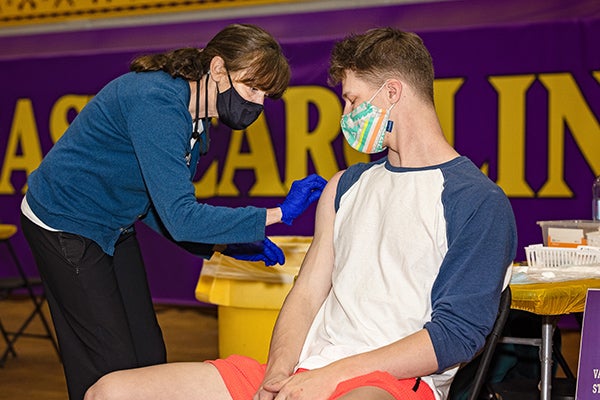Bolin busts myths about COVID-19 vaccines
East Carolina University’s Dr. Paul Bolin is a mythbuster when it comes to COVID-19.
Bolin, chair of the Department of Internal Medicine in ECU’s Brody School of Medicine, answered questions and assuaged fears about the COVID-19 vaccine during a March 29 recording for ECU’s “Talk Like a Pirate” podcast.
Below are a few of the myths discussed during the podcast and Bolin’s response.

Brady Sullivan gets vaccinated by Lisa Brantley of Student Health Services at a clinic in Minges Coliseum on April 7. (Photo by Cliff Hollis)
Since researchers have rushed development, can the effectiveness and safety of the vaccines be trusted?
Bolin said the vaccines work and are safe. Data is continually being collected and added. Because of the massive number of deaths worldwide, emergency use authorization was granted for the vaccines.
Similar actions were taken during the AIDS epidemic in the 1980s.
“What AIDS did to expand our knowledge of medicine was unbelievable. What COVID will teach us will eclipse that,” Bolin said.
Are we seeing any differences between any of the vaccines?
Bolin said all the vaccines are safe based on studies so far. “The right vaccine is the first one you can get in your arm,” he said.
Can you get COVID-19 from the vaccines?
No, but you can feel like you have COVID-19. Symptoms can include body aches, headaches, fever and chills.
Can I get COVID-19 after getting the vaccine? Can I still transmit COVID-19 to others if I have been vaccinated?
Yes. If you get COVID-19, and you have to get it (COVID-19) first, you can transmit it to others, Bolin said.
“In some ways it’s more of a concern,” said Bolin, noting that if someone is vaccinated, they may be out in public more and could have minimal or no symptoms which would allow them to transmit disease more easily.
It’s essential to continue taking precautions like mask wearing and being attentive to potential COVID-19 symptoms.
Will we eventually have to get COVID-19 booster shots?
There is probably a greater than 50% chance that we will have a booster, Bolin said.
Once vaccinated, can we stop wearing our masks and being socially distant?
We’re getting there, but we’re not there yet. The masks are the rock stars of the crisis because wearing them helps prevent spread of the virus, he said, like social distancing and washing hands.
Do COVID-19 vaccines change your DNA?
No, it’s an RNA vaccine. “It changes your ability to make proteins that are important,” Bolin said.

Dr. Paul Bolin talks about COVID-19 vaccine myths during the “Talk Like a Pirate” podcast. (Photo by Rich Klindworth)
Does it make you more susceptible (once it changes the proteins) to die from the flu or the common cold?
No, but it’s a fascinating question for different reasons, Bolin said. Data has shown that flu rates have been very low during the pandemic; part of the reason is people have been wearing masks.
“Some people believe we’ll have a very bad flu season,” he said. “I believe we’ll have mask wearing into 2022.”
If my spouse and I are vaccinated, but my kids are not, is it still safe for us to travel, visit family, eat in restaurants or have houseguests?
If you’re traveling, and you’re not safe (taking precautions against COVID-19) in that mobility, there’s risk, according to Bolin.